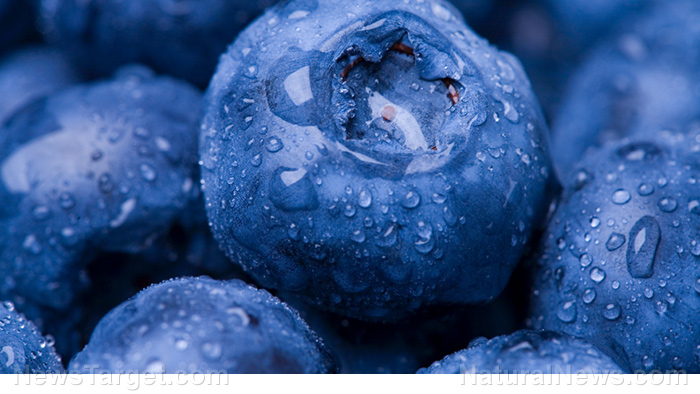Blueberries contain a specific substance that can prolong your life
11/01/2018 / By Isabelle Z.

The fabled Fountain of Youth might not exist, but a compound in blueberries can have a surprisingly significant anti-aging effect, making them the perfect fruit to consume for longevity. You might have already heard about the anthocyanins in blueberries that give them their blue color and their impressive antioxidant benefits, but the compound responsible for their extraordinary ant-aging effects is known as pterostilbene – and blueberries are the only place you can get it.
Pterostilbene is so beneficial because it activates three different pathways that play a role in aging. First of all, it increases the activity of the adenosine monophosphate-activated protein kinase, or AMPK, pathway. As you age, your AMPK activation slows down, and this contributes to accelerated aging and weight gain. That’s because AMPK regulates your body’s production of energy.
Increasing AMPK pathway activity brings down fat and blood sugar levels in the blood while reducing body fat stores and chronic inflammation. It has also been shown to improve memory and stop the beta-amyloid plaque and tau tangles behind Alzheimer’s disease form forming. Therefore, it’s estimated to cause a 20 percent lifespan increase.
The second way that pterostilbene can extend your life is by limiting the expression of a signaling pathway known as mTOR, which regulates cell growth, proliferation and survival. When things go wrong with this pathway, it can lead to chronic degenerative conditions and cancer.
Scientists say that inhibiting this pathway by 25 percent can result in a 20 percent lifespan increase, and animal studies back this up.
Finally, pterostilbene modulates the sirtuins pathway. Anti-aging sirtuin molecules in your body help to maintain the length of telomeres, which is very important in longevity, while also regulating DNA repair. Moreover, it does such a good job of stopping heart cells from dying that it’s being explored by researchers as a potential way of mitigating injury to the heart muscle after a heart attack. It can also reduce systolic and diastolic blood pressure.
Dementia and Alzheimer’s
Having a long life is only great if you can enjoy it; no one wants to add years to their life if they’re going to be miserable. Thankfully, pterostilbene can also prevent dopamine loss in the memory centers in aged rats, and it’s hoped that these benefits extend to humans as well.
Blueberries also contain antioxidants like myricetin, arbutin, chlorogenic acid, and anthocyanins, all of which are strong neuroprotectants that can boost cognition and prevent the brain from experiencing age-related changes. For example, a 2010 study in the Journal of Agricultural and Food Chemistry found that regular blueberry consumption could mitigate neurodegeneration and slow the development of Alzheimer’s and dementia.
A study published in the Experimental Gerontology journal revealed that blueberry extract can extend the lifespan of fruit flies by a mean of 10 percent by increasing the expression of certain genes that prolong lifespan while decreasing the expression of the genes that accelerate aging.
Eat more blueberries!
Blueberries are delicious on their own, and they’re also easy to incorporate into other dishes. They work great in smoothies and oatmeal, and they’re also delicious served with cottage cheese or yogurt. Use them as the base of a fruit salad with other superfoods, or add some to a green salad for an antioxidant boost.
They’re versatile, tasty, and can extend your life, but many people say cost prevents them from consuming as many as they’d like. Although blueberries can be expensive when they’re out of season, you could consider growing your own depending on your climate. As always, you want to seek organic varieties to avoid introducing longevity-destroying pesticides into your body.
Read more coverage of the healing power of blueberries at Blueberries.news.
Sources for this article include:
Tagged Under: aging, AMPK pathway, anti-aging, Blueberries, blueberry extract, brain health, food is medicine, fruit, grocery cures, longevity, mind body science, natural remedies, nutrients, prevention, sirtuin pathways


















